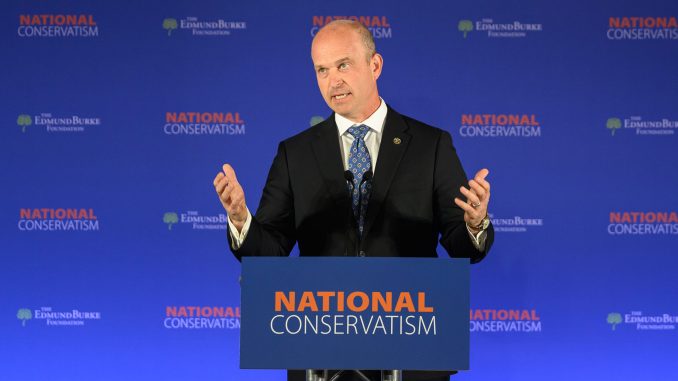
Cultural crises and crumbling Western institutions can only be remedied by a broader conservative movement that remains focused on the renewal of national identity and the ultimate ends of its policy means, the president of The Heritage Foundation told a London audience Tuesday.
Heritage President Kevin Roberts spoke at the National Conservatism conference in London on what he called “one-nation Burkeanism,” a reference to famed 18th-century conservative British statesman Edmund Burke. (The Daily Signal is the news outlet of The Heritage Foundation.)
Roberts laid out the case that conservatives in the West must not only stand athwart the increasingly totalitarian globalist Left, but must also promote a positive agenda that strengthens the building blocks of society—family, church, and communities.
That movement begins, but doesn’t end, with protecting the concept of nationhood itself.
“Like the election of Donald Trump in the United States that same year, Brexit lifted the hopes and expanded the horizons of a more nationalist conservatism across the West,” the Heritage Foundation chief said. Brexit (shorthand for “British exit”) was the June 2016 referendum in which the British voted to pull the United Kingdom out of the European Union.
Unfortunately, Roberts explained, despite the momentum created by Brexit and Trump’s election, center-right parties failed to translate those victories into a “reimagined governing agenda.” He said that the failure to come up with a comprehensive policy program is catastrophic for those parties, especially given the single-minded obsession of the Left to impose its ideas on societies.
The “greedy, woke, elitist, and globalist” New Left has forsworn many of the ideas espoused by their predecessors, such as “democracy, equality, diversity, justice,” Roberts said. “Their goal is not to win political contests, but to end them altogether, to sweep away dissent and any subversive institution.”
What most effectively impedes this wokeist nightmare is the kind of conservatism espoused by the likes of “Donald Trump and [Florida Gov.] Ron DeSantis, Brexit, [Hungarian Prime Minister] Viktor Orban, and this conference,” Roberts said, adding:
The institution of the nation is the source and reservoir of the power globalists need to achieve their goals, and one of the most resistant to elite capture.
Unlike corporations, governments, and even churches, nations have no C-suites to cajole or HR departments to bully. They have cultures, loyalties, and loves prior to mere policy—and [with] these, the power to defeat globalist ambitions.
It’s those traits that make national conservatism a more implacable bulwark than “establishment conservatism,” whose leaders “crave elite approbation” or “blinkered libertarianism,” which is susceptible to the material outlook common on the Left’s home turf, Roberts said.
He said that conservative parties since the Cold War have been adrift, having lost sight of the “permanent things” they were created to preserve.
“Somewhere along the way, conservative leaders forgot that markets, globalization, individualism, [gross domestic product] growth, and foreign alliances were means, not ends,” he said, and this made for ineffectual opposition to the Left, which has no such confusion and works relentlessly to do battle against those who defend “faith, family, flag.”
In that sense, national conservatism isn’t a departure from the ideas of Ronald Reagan or Margaret Thatcher, Roberts said, but an affirmation of what those leaders and the movements that championed them really stood for. And what they stood for were concepts such as “democracy, the rule of law, free speech, religious devotion, marriage and family, ordered liberty, property rights, and yes, the real free market,” he said.
The current ruling class ultimately stands in opposition to those things while despising even the idea of nationhood, he said, and “thus did yesterday’s fruitful one-nation conservatism beget today’s sterile, no-nation globalism.”
So, in the place of national institutions, the “woke industrial complex,” as he called it, creates a kind of elitist totalitarianism through the European Union and the United Nations. He said that the globalist elites seek to destroy the “little platoons” of society, as Burke called them, because they are rivals to that power.
“To the globalist elites, Burke’s ‘little platoons’ are terrorist sleeper cells,” Roberts said.
He returned to his message about how one-nation national conservatism stands athwart the globalist ethos and directly challenges its power.
“Leaving the European Union and formally detaching itself from the EU elites’ masquerade ball was precisely the right thing for the United Kingdom to do,” Roberts said, referring to Brexit. However, that triumph shouldn’t be seen as the ultimate victory, since “wars are not won by evacuations,” he said, referring to Winston Churchill’s famous speech about the Battle of Dunkirk.
The Heritage president then returned to the main theme of his remarks:
The question since 2016 has not been whether the British people have the power to navigate the 21st century as an independent nation-state. Clearly, they do.
Nor is the question whether global corporate, political, and cultural elites will let them, because in the real world, they have almost no say in the matter.
Rather, the question is whether the Conservative Party—like the Republican Party in the U.S.—can follow through on their 2016 victories and build a new, governing majority out of a new, one-nation conservatism.
That’s the kind of nationalism and populism the elites truly fear, Roberts said. Its principles, he said, boil down to the idea that the United Kingdom belongs to “her people” and that its “political, corporate, spiritual, and civic institutions should serve them and not the other way around.”
Have an opinion about this article? To sound off, please email letters@DailySignal.com and we’ll consider publishing your edited remarks in our regular “We Hear You” feature. Remember to include the url or headline of the article plus your name and town and/or state.

